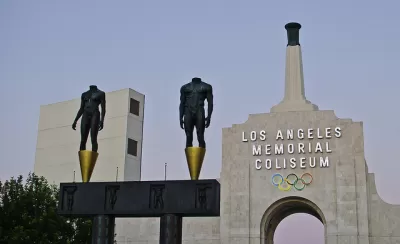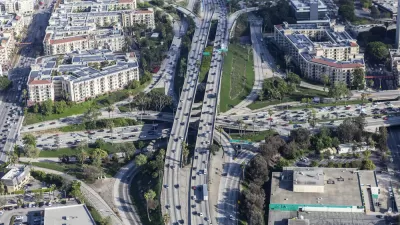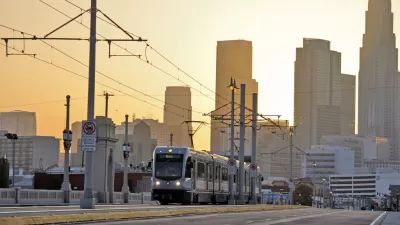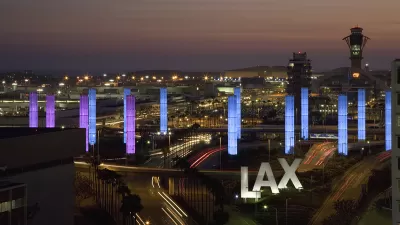Ahead of the 2028 Olympic Games, Los Angeles is rallying around infrastructure buildout and technological advancement.

Los Angeles could see an Olympic Games that is entirely connected by transit, organizers say. At the VerdeXchange 2018 Conference in Downtown L.A., AECOM sports leader Bill Hanway announced, "In our plan, each sports park is entirely accessible by public transport. No private cars will be used at all during the course of the Games."
That vision is driven in large part by LA Metro's plan to accelerate 28 projects for the Olympics, which CEO Phil Washington told the conference is the most ambitious transportation infrastructure initiative in the country. Metro is also in talks with Elon Musk about using his tunnel-boring technology to speed up projects, Washington said.
L.A. hopes that using the Olympics as a stimulus to strengthen existing infrastructure could drive important advancements for the region, unlike in other cities where hosting ended in empty husks and copious debt. Sharing lessons from past games, the panel noted that L.A.'s last go-around, in 1984, prompted the launch of the country's first program to synchronize traffic signals.
But since the city is now in the unusual position of preparing for the games 11 years ahead of time, it must allow for the near certainty that new technologies—especially transportation technologies—will push the limits of what current infrastructure plans can deliver or even imagine.
Justin Erbacci, chief innovation officer at LAX, told the panel that the airport is planning to have not only autonomous cars, but also flying cars (a.k.a. vertical take-off and landing vehicles) in service by the 2028 Olympics. That's on top of the modernization program the airport is already undertaking, which includes an automated people mover that will connect it to Metro rail for the first time.
Read the full discussion in The Planning Report, or watch it on video.
FULL STORY: LA's 2028 Olympics Already Catalyzing Transformative Infrastructure Investments

Alabama: Trump Terminates Settlements for Black Communities Harmed By Raw Sewage
Trump deemed the landmark civil rights agreement “illegal DEI and environmental justice policy.”

Study: Maui’s Plan to Convert Vacation Rentals to Long-Term Housing Could Cause Nearly $1 Billion Economic Loss
The plan would reduce visitor accommodation by 25% resulting in 1,900 jobs lost.

Planetizen Federal Action Tracker
A weekly monitor of how Trump’s orders and actions are impacting planners and planning in America.

Waymo Gets Permission to Map SF’s Market Street
If allowed to operate on the traffic-restricted street, Waymo’s autonomous taxis would have a leg up over ride-hailing competitors — and counter the city’s efforts to grow bike and pedestrian on the thoroughfare.

Parklet Symposium Highlights the Success of Shared Spaces
Parklets got a boost during the Covid-19 pandemic, when the concept was translated to outdoor dining programs that offered restaurants a lifeline during the shutdown.

Federal Homelessness Agency Places Entire Staff on Leave
The U.S. Interagency Council on Homelessness is the only federal agency dedicated to preventing and ending homelessness.
Urban Design for Planners 1: Software Tools
This six-course series explores essential urban design concepts using open source software and equips planners with the tools they need to participate fully in the urban design process.
Planning for Universal Design
Learn the tools for implementing Universal Design in planning regulations.
Caltrans
Smith Gee Studio
Institute for Housing and Urban Development Studies (IHS)
City of Grandview
Harvard GSD Executive Education
Toledo-Lucas County Plan Commissions
Salt Lake City
NYU Wagner Graduate School of Public Service





























